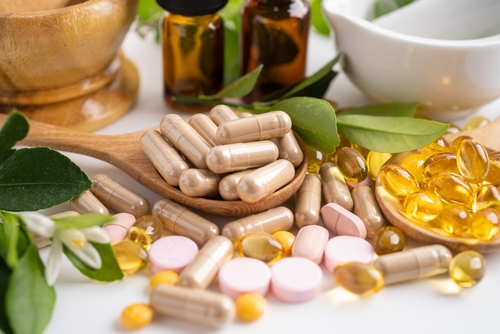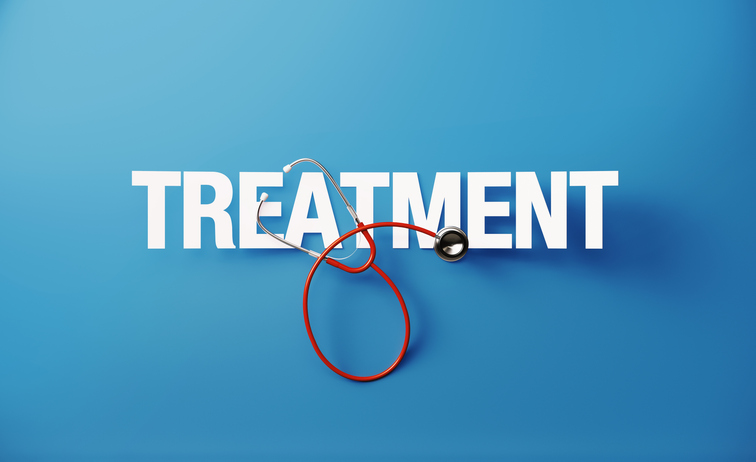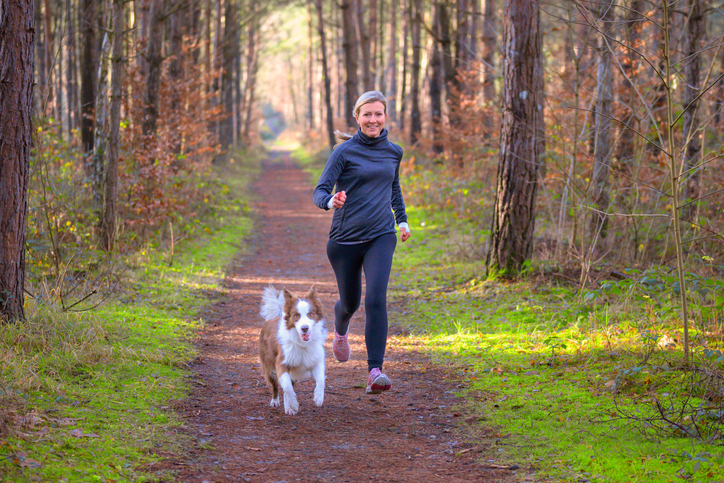
There has been an increasing interest in complementary and alternative medicine (CAM) in the United States, including herbal supplements. Herbal supplements are often used despite lack of evidence for their safety or efficacy and are notably not regulated by the Food and Drug Administration (FDA). Some case reports have been published linking autoimmune disease onset or exacerbation to use of immunostimulatory herbal supplements. Thus, Faden et al sought to better understand the frequency and characteristics of herbal supplement treatment in adult patients with autoimmune skin diseases and identify which herbal supplements may present increased risks to these patients (1).
This study, published in ACR Open Rheumatology, enrolled adult patients with clinical or pathologic evidence of dermatomyositis (DM) or cutaneous lupus erythematosus (CLE) seen at the University of Pennsylvania between 2007 and 2024. Clinical and demographic data were collected including disease flares, and patients were surveyed about herbal supplement treatments. Specific supplements with immunostimulatory properties were screened including spirulina, elderberry, ashwagandha, echinacea, chiorella, and alfalfa. Retrospective chart review was performed to determine the impact of herbal supplement treatment. A flare was defined by worsening or new skin lesions for CLE and DM and/or new or worsening muscle involvement for patients with DM. Skin flares were determined by patient report and objective examination, and muscle flares determined by patient report, objective examination, and laboratory findings of muscle involvement. The association was considered unclear if other factors contributed to exacerbation, and no associations were drawn if timing of herbal supplement use was unavailable.
The analysis included 673 patients of which 56% had a diagnosis of DM and 44% had CLE. The cohort was predominantly female (86%) and of White race (70%) followed by Black (21%), Asian (4%), and Hispanic (4%) race. Interestingly 32% of the cohort reported herbal supplement treatment use. Those who used herbal supplements were younger than those who did not; Hispanic patients also had a significantly higher frequency of herbal supplement use. While herbal supplement treatment did not differ significantly between DM and CLE, interestingly patients with DM were four times more likely to experience a disease exacerbation after herbal supplement use compared to CLE. The supplements with highest risk for disease exacerbation included elderberry and spirulina.
This study has some limitations, including its retrospective nature and recruiting from one medical center, limiting generalizability. The authors hypothesize that inflammatory response to these herbal supplements may due to immunostimulating properties, such as the TLR4 pathway activated by spirulina in patients with dermatomyositis. This research demonstrates the importance of investigating potential negative impact of herbal supplements and other CAM modalities, which are sometimes perceived and accepted as entirely benign by patients and practitioners. An increasing interest among patients in complementary and alternative medicine coupled with a dearth of information on safety or efficacy of these therapies, including herbal supplements, could prove potentially damaging to our patients with rheumatic diseases. Similarly, there are potential benefits of CAM but studies often lacking to assess these in an objective matter. Additional future studies are needed to investigate the impact of herbal supplements across a wide spectrum of rheumatic autoimmune diseases.
There has been an increasing interest in complementary and alternative medicine (CAM) in the United States, including herbal supplements. Herbal supplements are often used despite lack of evidence for their safety or efficacy and are notably not regulated by the Food and Drug Administration (FDA). Some case reports have been published linking autoimmune disease onset or exacerbation to use of immunostimulatory herbal supplements. Thus, Faden et al sought to better understand the frequency and characteristics of herbal supplement treatment in adult patients with autoimmune skin diseases and identify which herbal supplements may present increased risks to these patients (1).
This study, published in ACR Open Rheumatology, enrolled adult patients with clinical or pathologic evidence of dermatomyositis (DM) or cutaneous lupus erythematosus (CLE) seen at the University of Pennsylvania between 2007 and 2024. Clinical and demographic data were collected including disease flares, and patients were surveyed about herbal supplement treatments. Specific supplements with immunostimulatory properties were screened including spirulina, elderberry, ashwagandha, echinacea, chiorella, and alfalfa. Retrospective chart review was performed to determine the impact of herbal supplement treatment. A flare was defined by worsening or new skin lesions for CLE and DM and/or new or worsening muscle involvement for patients with DM. Skin flares were determined by patient report and objective examination, and muscle flares determined by patient report, objective examination, and laboratory findings of muscle involvement. The association was considered unclear if other factors contributed to exacerbation, and no associations were drawn if timing of herbal supplement use was unavailable.
The analysis included 673 patients of which 56% had a diagnosis of DM and 44% had CLE. The cohort was predominantly female (86%) and of White race (70%) followed by Black (21%), Asian (4%), and Hispanic (4%) race. Interestingly 32% of the cohort reported herbal supplement treatment use. Those who used herbal supplements were younger than those who did not; Hispanic patients also had a significantly higher frequency of herbal supplement use. While herbal supplement treatment did not differ significantly between DM and CLE, interestingly patients with DM were four times more likely to experience a disease exacerbation after herbal supplement use compared to CLE. The supplements with highest risk for disease exacerbation included elderberry and spirulina.
This study has some limitations, including its retrospective nature and recruiting from one medical center, limiting generalizability. The authors hypothesize that inflammatory response to these herbal supplements may due to immunostimulating properties, such as the TLR4 pathway activated by spirulina in patients with dermatomyositis. This research demonstrates the importance of investigating potential negative impact of herbal supplements and other CAM modalities, which are sometimes perceived and accepted as entirely benign by patients and practitioners. An increasing interest among patients in complementary and alternative medicine coupled with a dearth of information on safety or efficacy of these therapies, including herbal supplements, could prove potentially damaging to our patients with rheumatic diseases. Similarly, there are potential benefits of CAM but studies often lacking to assess these in an objective matter. Additional future studies are needed to investigate the impact of herbal supplements across a wide spectrum of rheumatic autoimmune diseases.
There has been an increasing interest in complementary and alternative medicine (CAM) in the United States, including herbal supplements. Herbal supplements are often used despite lack of evidence for their safety or efficacy and are notably not regulated by the Food and Drug Administration (FDA). Some case reports have been published linking autoimmune disease onset or exacerbation to use of immunostimulatory herbal supplements. Thus, Faden et al sought to better understand the frequency and characteristics of herbal supplement treatment in adult patients with autoimmune skin diseases and identify which herbal supplements may present increased risks to these patients (1).
This study, published in ACR Open Rheumatology, enrolled adult patients with clinical or pathologic evidence of dermatomyositis (DM) or cutaneous lupus erythematosus (CLE) seen at the University of Pennsylvania between 2007 and 2024. Clinical and demographic data were collected including disease flares, and patients were surveyed about herbal supplement treatments. Specific supplements with immunostimulatory properties were screened including spirulina, elderberry, ashwagandha, echinacea, chiorella, and alfalfa. Retrospective chart review was performed to determine the impact of herbal supplement treatment. A flare was defined by worsening or new skin lesions for CLE and DM and/or new or worsening muscle involvement for patients with DM. Skin flares were determined by patient report and objective examination, and muscle flares determined by patient report, objective examination, and laboratory findings of muscle involvement. The association was considered unclear if other factors contributed to exacerbation, and no associations were drawn if timing of herbal supplement use was unavailable.
The analysis included 673 patients of which 56% had a diagnosis of DM and 44% had CLE. The cohort was predominantly female (86%) and of White race (70%) followed by Black (21%), Asian (4%), and Hispanic (4%) race. Interestingly 32% of the cohort reported herbal supplement treatment use. Those who used herbal supplements were younger than those who did not; Hispanic patients also had a significantly higher frequency of herbal supplement use. While herbal supplement treatment did not differ significantly between DM and CLE, interestingly patients with DM were four times more likely to experience a disease exacerbation after herbal supplement use compared to CLE. The supplements with highest risk for disease exacerbation included elderberry and spirulina.
This study has some limitations, including its retrospective nature and recruiting from one medical center, limiting generalizability. The authors hypothesize that inflammatory response to these herbal supplements may due to immunostimulating properties, such as the TLR4 pathway activated by spirulina in patients with dermatomyositis. This research demonstrates the importance of investigating potential negative impact of herbal supplements and other CAM modalities, which are sometimes perceived and accepted as entirely benign by patients and practitioners. An increasing interest among patients in complementary and alternative medicine coupled with a dearth of information on safety or efficacy of these therapies, including herbal supplements, could prove potentially damaging to our patients with rheumatic diseases. Similarly, there are potential benefits of CAM but studies often lacking to assess these in an objective matter. Additional future studies are needed to investigate the impact of herbal supplements across a wide spectrum of rheumatic autoimmune diseases.
References:
[1] Faden DF, Stone CJ, Xie L et al. Prevalence and Risk of Immunostimulatory Herbal Supplement Treatment Among Autoimmune Dermatology Patients. ACR Open Rheumatology, September 2024.







 © 2025 Mashup Media, LLC, a Formedics Property. All Rights Reserved.
© 2025 Mashup Media, LLC, a Formedics Property. All Rights Reserved.